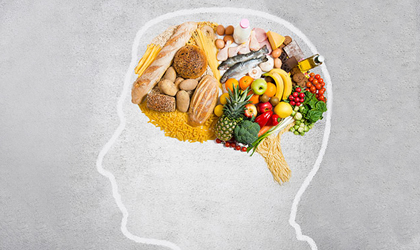
Stress seems to have become the default state of the modern world. And with the constant barrage of news, rising cost of living, and ‘always-on’ lifestyles, this isn’t surprising. While some stress can be manageable and even helpful in certain situations, chronic stress poses significant risks to physical and mental health.

To effectively manage stress and support brain health, it’s important to have tools in your arsenal. In this article, we outline the four simple yet powerful ways to combat stress, nurture your mind, and improve your overall wellbeing.
Move more
Exercise, in nearly any form, can support mental health and manage stress. And there are many reasons for this. Firstly, movement stimulates the release of ‘feel-good’ neurotransmitters. These include endorphins, endocannabinoids and dopamine, which naturally lift mood and help you relax (2)
Engaging in physical activity can also serve as a distraction from stress and anxiety. For instance, if you’re playing a fast-paced game of tennis, you can’t get lost in endless rumination; you must be present. Think of it as a moving meditation.
Besides this, regular movement helps support sleep, which, as outlined below, is equally critical for stress management.
Strive for at least 150 minutes of moderate or 75 minutes of vigorous activity weekly. Remember, you don’t need to join a gym to get moving. You can work out at home, hike with a friend, or do some heavy lifting in the garden.
Connect with others
Humans have a fundamental need for connection with others. And this makes sense from an evolutionary standpoint. When we were hunter-gatherers, being disconnected from the tribe would make us more vulnerable to attack. In other words, feeling connected means feeling safe; it’s the antithesis of stress.
Research suggests having close friends and familial ties may help prevent cognitive decline later in life (3). A study of 12,000 participants also found that loneliness increases the risk of neurodegenerative conditions by as much as 40 per cent (4).
Spending time with the people you love can help combat stress. Try to nurture the most valuable connections every week. It could be as simple as checking in with someone via text or arranging a walk with a close friend.
Prioritise sleep
Sleep is instrumental to a happy, healthy brain. Without enough high-quality rest every night, you can feel emotionally reactive, irritable, and stressed.
Unfortunately, the relationship between sleep and stress is complex. Stress can disrupt sleep, and lack of sleep can worsen stress, creating a negative feedback loop. However, with good sleep hygiene practices, you can help break this cycle.
Tips for better sleep
-
Try to wake up and go to bed at the same time each day.
-
Ensure your bedroom is dark, temperate, and quiet.
-
Avoid alcohol before bed. If you want a drink, enjoy it earlier in the evening.
-
Refrain from drinking caffeine after midday.
-
Try to get exposure to natural morning light to regulate your circadian rhythm.
You can read more about supporting your sleep on our dedicated Sleep Health Hub.
Fine-tune your nutrition
The evolving field of nutritional psychiatry demonstrates how food can influence mood and overall wellbeing (7). If you want to combat stress, consider focusing on the following areas.
Feed your gut
In recent years, scientists have discovered a complex neural network that connects the brain and the gut: the gut-brain axis (8). Researchers believe our gut microbiome, comprising trillions of bacteria in the digestive tract, can affect mood and emotion via this intricate communication system (9). All this is to say that a happy, balanced gut often means a happy, balanced mind.
Easy ways to support the gut microbiome
-
Aim for 30 plant foods every week. Plant foods include fruit, vegetables, nuts, seeds, whole grains, legumes (chickpeas and lentils), and beans.
-
Add live cultures, which consist of good bacteria to support the gut.
-
Try fructo-oligosaccharides (FOS), a soluble fibre that supports bowel regularity.
-
Include more fermented foods, such as kimchi, kefir, and kombucha, as they may increase microbial diversity.
Take care with triggers
The likes of caffeine, refined sugar, ultra-processed foods, and alcohol can often worsen symptoms of stress. For now, at least, you may want to reduce your intake of these foods.
Add specific nutrients
B vitamins
The B vitamins are essential for your emotional wellbeing. However, stress and certain medications can often lead to poor B vitamin absorption, so it’s worth paying extra attention to your intake.
-
Vitamin B1 is essential for maintaining the nervous system. Find it: Seeds.
-
Vitamin B6 contributes to normal psychological function. Find it: Bananas.
-
Vitamin B12 contributes to normal psychological function. Find it: Nutritional yeast.
Since the B vitamins work synergistically to repair and regenerate the nervous system, taking all three B vitamins together in a high-strength B complex is often recommended.
Considering this, you might want to try Neuro-B formulated with healthy nerves in mind. This all-in-one formula contains relevant vitamins B1, B6 (as PSP), and B12 to support nervous system function."
Magnesium
An essential mineral involved in over 300 biochemical processes, magnesium contributes to normal psychological and nervous system function, making it a useful addition for mental health. Find it: Cacao powder.
Omega 3
The long-chain omega 3 fatty acid, DHA (docosahexaenoic acid), is essential for cognitive health. DHA supports normal brain function based on a daily intake of 250mg. Find it: Salmon or plant-based microalgae in supplement form.
Adaptogens
Adaptogens like Ashwagandha and Rhodiola Rosea may help restore the body to a state of balance.
L-theanine
An amino acid found in green and black tea, L-theanine, is known for its calming and soothing properties. It’s often recommended for people with busy, frenetic lifestyles.
5-HTP
5 hydroxytryptophan, or 5-HTP, is the natural compound manufactured from the amino acid tryptophan. The brain converts 5-HTP into serotonin, the ‘happy’ hormone, which plays an important role in mood.
PEA
PEA (Palmitoylethanolamide) is a well-researched alternative to CBD. It’s an excellent choice for mood and overall wellbeing.
Want to find out more?
Our bodies are relatively well-insulated against the short-term impact of stressors. However, chronic, unremitting stress can significantly impact many areas of health, including the brain.
If managing stress becomes too challenging, seeking support is always a good idea. Consider talking to your GP or consulting a therapist for guidance. Alternatively, many Charities and other community organisations also offer help, advice and support, find out more here.
For more information on supporting your emotional health, please contact our team of expert Nutrition Advisors or head over to Nutrition Buzz.
References:
-
Wallensten, J., Ljunggren, G., Nager, A., et al.. Stress, depression, and risk of d******* - a cohort study in the total population between 18 and 65 years old in Region Stockholm. Alz Res Therapy. 2023;15:161.
-
Basso JC, Suzuki WA., The Effects of Acute Exercise on Mood, Cognition, Neurophysiology, and Neurochemical Pathways: A Review. Brain Plast. 2017;2(2):127-152.
-
Age UK. Social Connections and the brain. [online] Available at: https://www.ageuk.org.uk/information-advice/health-wellbeing/mind-body/staying-sharp/looking-after-your-thinking-skills/social-connections-and-the-brain/
-
Sutin AR, Stephan Y, Luchetti M, Terracciano A., Loneliness and Risk of D*******. J Gerontol B Psychol Sci Soc Sci. 2020;75(7):1414-1422.
-
Vandekerckhove M, Wang YL., Emotion, emotion regulation and sleep: An intimate relationship. AIMS Neurosci. 2017;5(1):1-17.
-
Walker MP, van der Helm E., Overnight therapy? The role of sleep in emotional brain processing. Psychol Bull. 2009;135(5):731-48.
-
Zhao Y, Yang L, et al.., The brain structure, immunometabolic and genetic mechanisms underlying the association between lifestyle and depression. Nature Mental Health. 2023.
-
Carabotti M, Scirocco A, Maselli MA, Severi C., The gut-brain axis: interactions between enteric microbiota, central and enteric nervous systems. Ann Gastroenterol. 2015;28(2):203-209.
-
Taylor AM, Holscher HD., A review of dietary and microbial connections to depression, anxiety, and stress. Nutritional Neuroscience. 2020;23:3, 237-250.
You Might Also Like

Olivia
Olivia Salter has always been an avid health nut. After graduating from the University of Bristol, she began working for a nutritional consultancy where she discovered her passion for all things wellness-related. There, she executed much of the company’s content marketing strategy and found her niche in health writing, publishing articles in Women’s Health, Mind Body Green, Thrive and Psychologies.
View More



